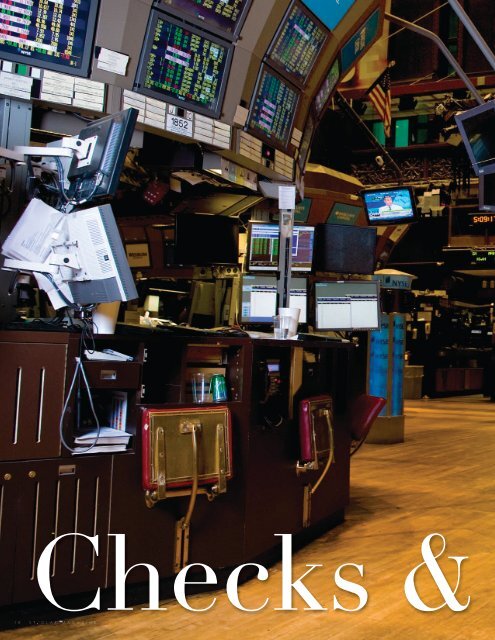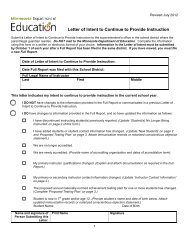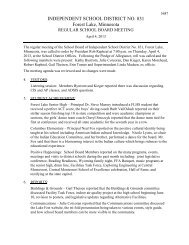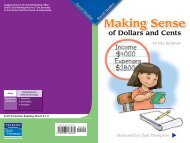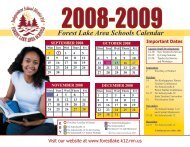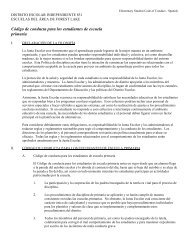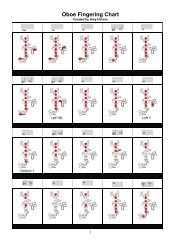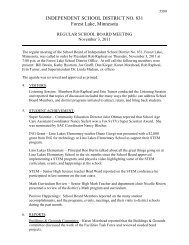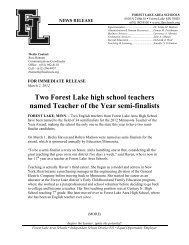Maki - St. Olaf College
Maki - St. Olaf College
Maki - St. Olaf College
You also want an ePaper? Increase the reach of your titles
YUMPU automatically turns print PDFs into web optimized ePapers that Google loves.
Checks &
Dean <strong>Maki</strong> ’87, chief U.S. economist at<br />
Barclays Capital in New York, spends his<br />
days analyzing and forecasting the U.S.<br />
economy and monetary and fiscal policy.<br />
Balances<br />
BY KIM ODE | PHOTOGRAPHED BY MICHAEL SOFRONSKI
“<br />
Feel free to stop me,”<br />
Dean <strong>Maki</strong> says. He was<br />
about to begin answering<br />
the first question that<br />
comes to mind when<br />
you get a moment with<br />
an economist who was<br />
named “the most accurate<br />
forecaster” for 2009 by<br />
Bloomberg News. Here is a person who has surpassed<br />
all others in their ability to prognosticate, or even<br />
guesstimate, during one of the more chaotic periods<br />
in the history of the U.S. economy.<br />
<strong>Maki</strong>, a 1987 <strong>St</strong>. <strong>Olaf</strong> graduate, suspected that his answer<br />
might prove befuddling. He realizes that however many bread<br />
crumbs he might drop as navigational aids through the language<br />
of economists, they may as well be birdseed to those who give<br />
themselves high fives when their checkbooks balance.<br />
<strong>St</strong>ill, the question about his skills comes as much from awe<br />
as from curiosity: How do you do that<br />
“We use a mixture of econometric models as well as previous<br />
business cycles and look at how the economy has both gone into<br />
and come out of recession,” <strong>Maki</strong> says. As he elaborates, you<br />
really don’t think to stop him, because in the midst of talking<br />
about the wealth effect and quintiles and high-income spending<br />
events, he speaks in a way that enables you to grasp the concepts.<br />
<strong>Maki</strong>, forty-four, is explaining a recent economic situation<br />
that, for many Americans, has seemed inexplicable, or perhaps<br />
just depressing. But he says that we’re moving toward the<br />
proverbial light at the end of the tunnel. It may be little more<br />
than a soft glow so far, but it sure beats clacking along in the<br />
dull darkness of recession.<br />
“We do think that the recession is over,” says <strong>Maki</strong>, who is<br />
the chief U.S. economist at Barclay’s Capital in New York City.<br />
“It ended last summer and the economy is growing.<br />
“What’s debatable is whether the economy is acting as it<br />
has coming out of previous recessions. The consensus view was<br />
that this time was different from all other previous cycles and<br />
the standard dynamics wouldn’t work.<br />
“Our view was that the standard dynamics would work,<br />
and so far that has proven true. Deep recessions have been<br />
followed by pretty strong recoveries, so we’re expecting a<br />
pretty strong recovery.”<br />
Growing up in Forest Lake, Minnesota, <strong>Maki</strong> hadn’t imagined<br />
life as a skilled practitioner of “the dismal science.” That’s<br />
the nickname bestowed on economics by Thomas Carlyle, a<br />
historian from the Victorian age, responding to an essay predicting<br />
that starvation would result as the population rose faster<br />
than the food supply.<br />
“There’s a strong presumption in<br />
much of the economic coverage that<br />
consumer debt is always a problem.<br />
But there is very little relationship<br />
between household debt levels<br />
and consumer spending.”<br />
<strong>Maki</strong> was interested in business, “but I didn’t really know<br />
what that meant.” His father, Franklin, was a guidance counselor<br />
at the junior high school in town; his mother, Ellen, a<br />
homemaker. He enrolled at <strong>St</strong>. <strong>Olaf</strong> and was immediately<br />
intrigued by his first economics course.<br />
“It was a way of understanding the world that I hadn’t<br />
thought of before, hadn’t encountered before,” he says. “The<br />
idea that you could put economics and unemployment into<br />
equations and describe them in that way was interesting to<br />
me, even exciting. It made sense out of the economy.”<br />
Among those instructors whom <strong>Maki</strong> singled out as<br />
2 0 S T . O L A F M A G A Z I N E
especially influential are<br />
Professor Emeritus of<br />
Economics William<br />
Carlson, who retired in<br />
2004 and who was<br />
<strong>Maki</strong>’s advisor, and<br />
Theodore Vessey, professor<br />
emeritus of mathematics,<br />
statistics, and<br />
computer science, who<br />
retired in 2005.<br />
“Vessey almost made<br />
me become a math<br />
major,” <strong>Maki</strong> says.<br />
“He really made math<br />
come alive.”<br />
<strong>Maki</strong> believes it would<br />
be helpful for many high<br />
school students if they<br />
had more instruction in<br />
economic matters.<br />
“Some of the research<br />
I’ve done shows that certainly<br />
exposure to personal<br />
finance courses<br />
when a person is young<br />
changed their behavior<br />
when they were adults in<br />
terms of savings rates,<br />
etc. A familiarity with<br />
economics and finance would help most people.”<br />
Not surprisingly, his kids, Alina, 12, and Ari, 9, are getting<br />
an in-house education in economics. “They do get an allowance,<br />
so they know savings versus spending. I tend to talk to them when<br />
they’re buying something [telling them] that someone is making<br />
their living by making that item, and you do pay a price for that.”<br />
<strong>Maki</strong> also tries to instill in them a sense of history that has, in<br />
certain quarters, seemed absent during the latest tumultuousness.<br />
“My daughter was asking about whether we’re going into<br />
another Great Depression, and we talked a lot about how hard<br />
policy makers are working to prevent a depression,” he says.<br />
“That’s what I want her to know, that there are people working<br />
hard to prevent that, and that we know more than we knew in<br />
the 1930s to prevent or recover from such a thing.”<br />
After graduating from <strong>St</strong>. <strong>Olaf</strong>, <strong>Maki</strong> went on to earn a<br />
Ph.D. from <strong>St</strong>anford University and then studied in Finland on a<br />
Fulbright scholarship — an inspired destination, given his<br />
Finnish heritage. There, he studied Finnish-Soviet trade.<br />
“It was a barter system and not the standard trade between<br />
countries,” he says. The Finns traded industrial goods for Soviet<br />
oil, a system that eventually grew imbalanced and led to a recession<br />
in Finland. Returning to the United <strong>St</strong>ates, <strong>Maki</strong> worked<br />
as an investment banking analyst at Norwest in Minneapolis<br />
for about two years before getting a job as a senior economist<br />
at the Federal Reserve.<br />
At the Fed, <strong>Maki</strong>’s research focused on how consumer spending<br />
was linked to how households budgeted their money. He<br />
worked closely with Alan Greenspan, who in 1987 became<br />
chairman of the Federal Reserve.<br />
“We looked at the relationship between household balance<br />
sheets and savings rates by income group — what we call quintiles,”<br />
or five equal populations into which a statistical sample<br />
can be divided.<br />
“We found that the large part of the wealth increase in the<br />
late ’90s was in the top income quintile, the top 20 percent.<br />
But the entire decline in the savings rate was in the top quintile<br />
as well.<br />
“There was a strong indication that the stock market’s<br />
wealth effect was driving spending,” <strong>Maki</strong> says. The wealth<br />
effect is when an increase in wealth directly causes households to<br />
increase their consumption and decrease their rate of saving.<br />
<strong>Maki</strong> explains that when the stock holdings among the wealthy<br />
increased in value, they spent more, which helped describe why<br />
consumer spending was so strong.<br />
The late ’90s, <strong>Maki</strong> says in a typically low-key statement of<br />
fact, “was a high-income spending event.”<br />
<strong>Maki</strong>’s Minnesotan reserve suits the style of<br />
Barclays Capital, says Dean Kantor, Barclays’s<br />
head of research. “Our clients value substance<br />
over flashy catchphrases, and Dean delivers<br />
that in spades,” Kantor says. “What is particularly<br />
refreshing about Dean is that he always behaves with great<br />
humility. He has not allowed his success to go to his head.”<br />
Listening well and respectfully is another <strong>Maki</strong> hallmark.<br />
“Although his views are backed by detailed and careful analysis,<br />
he does not ram it down people’s throats. This approach really<br />
impresses our clients, since much of the richness of Dean’s analysis<br />
comes out of his answers to clients’ questions, rather than<br />
flaunting it all out front,” Kantor says.<br />
Consider <strong>Maki</strong>’s take on how we regard debt. Consumers<br />
generally consider debt in a negative light, but <strong>Maki</strong> is more<br />
concerned with how the media follow suit. When the Fed<br />
looked at all references to consumer debt in The New York<br />
Times since 1950, it found that 80 percent of the references<br />
had a negative context.<br />
“There’s a strong presumption in much of the economic<br />
coverage that consumer debt is always a problem,” <strong>Maki</strong> says.<br />
“But there is very little relationship between household debt<br />
levels and consumer spending.”<br />
Here’s why that presumption doesn’t hold water: Granted,<br />
he says, credit problems often are overwhelming among lowerincome<br />
households, especially over the past two years. But consumer<br />
spending by those in the top quintile is responsible for<br />
half of the nation’s spending and very rarely goes delinquent.<br />
“So although debt levels remain quite high, you are seeing<br />
consumer spending bounce back,” he says. “There’s just not<br />
much of a relationship here. Income growth and the wealth<br />
effect drives consumer spending. Income rebounds as production<br />
rises, and wealth effects are becoming less negative.”<br />
S P R I N G 2 0 1 0 2 1
<strong>Maki</strong> left the Fed to work at JP Morgan Chase, where<br />
he was vice president of economic research responsible<br />
for forecasts of Federal Reserve policy and treasury debt.<br />
In 2005, he joined Barclays Capital; last year, he was promoted<br />
to its chief U.S. economist.<br />
“Dean’s experience and deep knowledge of the U.S.<br />
economy is valued by our clients worldwide,” Kantor<br />
said in making the announcement.<br />
Perhaps one reason <strong>Maki</strong> can successfully explain the<br />
intricacies of econometrics stems from the liberal arts<br />
aspect of his education, especially all the writing he did.<br />
“I write constantly in my current job, and having<br />
English, history, and liberal arts courses was invaluable.”<br />
And then there was the hockey. Being a<br />
Minnesotan, and a Finnish Minnesotan,<br />
<strong>Maki</strong> says he spent many hours on<br />
local rinks and also played goalie while<br />
at <strong>St</strong>. <strong>Olaf</strong>.<br />
“That certainly was useful in learning how to persevere<br />
through adversity, learning to set goals, learning not<br />
to be intimidated. That also was an important part of the<br />
<strong>St</strong>. <strong>Olaf</strong> experience.”<br />
His hockey days are history. “As a goalie, it’s not as<br />
much fun to get shot at when you’re not in excellent<br />
hockey shape,” he says, laughing.<br />
increasingly out of sync with their values.”<br />
Another looming issue the impact of which extends<br />
far beyond a two-year horizon is the aging of the Baby<br />
Boom generation and its entry into the ranks of the<br />
retired. This transition has a number of aspects, but chief<br />
among them is that as baby boomers leave the workforce,<br />
the economy’s rate of growth will slow a bit, or at least<br />
grow less rapidly.<br />
“The potential growth in the economy will be much<br />
slower than we’ve been used to,” he says, adding that<br />
the unemployment rate will drop “a lot faster than<br />
others expect.”<br />
As more Americans draw on the government’s entitlement<br />
programs such as Medicare and Social Security, a<br />
“significant deficit” could emerge. The question, he says,<br />
is, “Will the public and politicians be willing to make the<br />
difficult choices to fund the entitlement programs”<br />
Difficult choices, of course, mean choices that<br />
“involve someone giving up something,” whether that’s<br />
raising the retirement age, raising taxes, or giving up<br />
some health benefits.<br />
“An important question is whether our political system<br />
will be up to the task.”<br />
<strong>Maki</strong>, who lives in Rye, New York, with his wife,<br />
Jody [Kamrowski], a 1989 <strong>St</strong>. <strong>Olaf</strong> grad, seems to<br />
approach life with an essential optimism.<br />
“The economy will do fine if households decide what is best for their<br />
household, decide what to spend today versus what to save today.”<br />
In his forecasting work, <strong>Maki</strong> views the world in<br />
two-year increments. “After that, the zone of uncertainty<br />
grows bigger.”<br />
That’s one reason it’s difficult to predict much of what<br />
may follow the passage of the health care reform legislation,<br />
he says.<br />
“I don’t think the health care bill is going to have a<br />
major impact on economic growth in the near term,”<br />
<strong>Maki</strong> notes, adding that the Congressional Budget Office<br />
says that the budget deficit will be reduced over ten years.<br />
“The risk is that the major revenues increases are a<br />
number of years off,” he says. “Will some future Congress<br />
find it less desirable to put those revenue increases in place”<br />
Pressed for more specifics, <strong>Maki</strong> politely but firmly<br />
says that he cannot comment much further on personalities<br />
or policies, given his public profile. “It may be perceived<br />
not as me speaking, but as Barclays’s speaking,” he says.<br />
Bottom line, as painful as this recession has been, it<br />
has served a purpose of slowing down some of the economy’s<br />
excesses. “Ideally, policy makers would be able to<br />
stop these excesses, but that’s not always possible,” he<br />
says. “An economy that never slows down could develop<br />
asset bubbles, in which prices for goods or stocks grow<br />
“Most consumers are not as irrational as some media<br />
would suggest,” he says. “There’s uncertainty now, yes,<br />
but it’s interesting that corporations seemed to panic<br />
even more than households did. They pulled back on<br />
investment spending and employment.”<br />
Kantor stresses the value of <strong>Maki</strong>’s ability and willingness<br />
to look at issues “with fresh eyes and in depth,<br />
rather than going with the easy, consensus view.”<br />
Regarding consumer attitudes during the recent crisis,<br />
“Dean found that the popular media characterizations —<br />
that consumers were using their home equity like a piggybank<br />
or an ATM — were simply not true,” Kantor says.<br />
In <strong>Maki</strong>’s considered opinion, the foundations of the<br />
nation’s economy may be found around its kitchen tables.<br />
Going forward, he says, it’s not so important for<br />
Congress, or the administration, or the Fed, or anyone to<br />
decide what the proper level for the saving rate should be.<br />
“The economy will do fine if households decide what is<br />
best for their household, decide what to spend today versus<br />
what to save today.”<br />
The most accurate forecaster has spoken.<br />
KIM ODE is a longtime staff writer for the Minneapolis <strong>St</strong>ar Tribune<br />
and a frequent contributor to <strong>St</strong>. <strong>Olaf</strong> Magazine.<br />
2 2 S T . O L A F M A G A Z I N E
In an interview with Bloomberg Television earlier this year,<br />
Dean <strong>Maki</strong> said: “The overall picture for 2010 will be an<br />
economy growing rapidly enough to bring down the<br />
unemployment rate to an average of 9.6 percent. The rate<br />
will reach about 9 percent by the end of 2010.”<br />
S P R I N G 2 0 1 0 2 3


